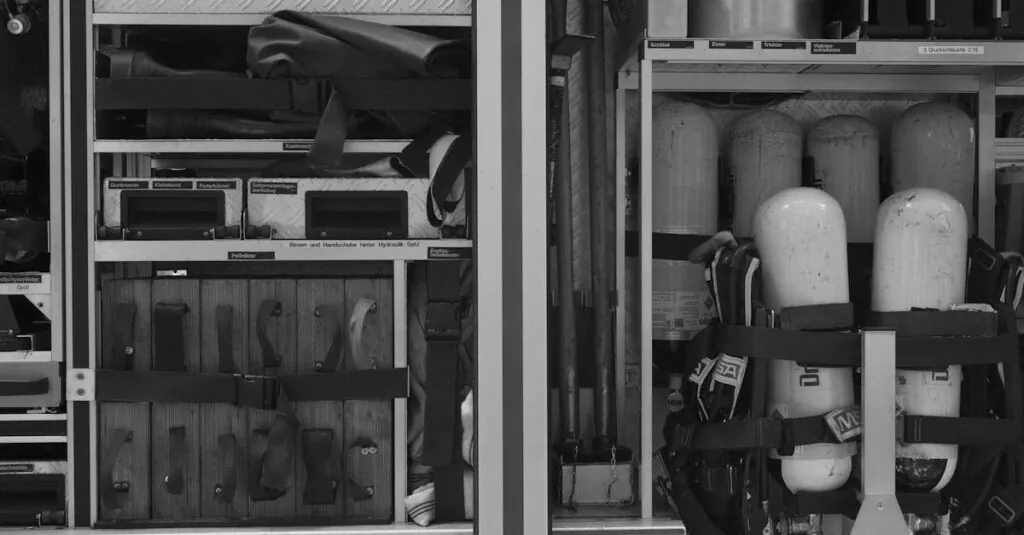Life’s a rollercoaster, and sometimes it feels like the ride’s stuck upside down. That’s where a resilience starter kit comes in handy. Think of it as your personal toolbox for navigating life’s curveballs—because who wouldn’t want to be the superhero of their own story?
With the right tools and mindset, bouncing back from setbacks can be as easy as finding the remote in the couch cushions. This kit isn’t just a collection of feel-good quotes and self-help books; it’s a practical guide to building mental strength, fostering optimism, and embracing challenges like a pro. So, grab your cape and get ready to transform those obstacles into stepping stones. Resilience isn’t just a buzzword; it’s your ticket to thriving in a world that loves to throw a few curveballs.
Table of Contents
ToggleOverview of Resilience Starter Kit
A resilience starter kit functions as a personal toolbox tailored for overcoming life’s challenges. This kit equips individuals with essential strategies to cultivate resilience.
Definition of Resilience
Resilience refers to the ability to adapt to adversity and bounce back from difficult situations. Characterized by flexibility and perseverance, resilience enables individuals to approach challenges with a proactive mindset. This trait encompasses emotional, mental, and physical components, allowing individuals to recover and grow stronger after setbacks. Studies emphasize that resilience isn’t innate; it can be developed and strengthened over time through practice and the right tools.
Importance of Resilience in Daily Life
Resilience plays a crucial role in daily life, influencing how individuals manage stress and adapt to change. Those equipped with resilience tackle obstacles effectively, turning difficulties into opportunities for growth. Furthermore, resilience contributes to better mental health, reducing anxiety and promoting a more positive outlook. By developing this trait, individuals enhance their relationships and improve overall well-being. Research highlights that resilient people often exhibit higher levels of creativity and problem-solving skills, making them more effective in both personal and professional environments.
Key Components of a Resilience Starter Kit
A well-rounded resilience starter kit includes various tools aimed at enhancing adaptability during challenges. Focusing on mental health tools, physical well-being resources, and social support strategies provides a comprehensive approach to building resilience.
Mental Health Tools
Mindfulness practices enhance emotional awareness and regulate stress. Journaling encourages self-reflection and helps individuals process thoughts and feelings. Meditation apps offer guided sessions, making it easier to incorporate mindfulness into daily routines. Setting realistic goals supports motivation and fosters a sense of accomplishment. Therapy resources like online platforms connect individuals with trained professionals, offering guidance and support in tough times.
Physical Well-being Resources
Regular exercise promotes mental resilience by releasing endorphins and reducing stress. Nutrition plays a crucial role; balanced meals support overall well-being and energy levels. Sleep hygiene practices, like establishing a bedtime routine, improve restorative sleep, which is vital for emotional regulation. Access to outdoor activities encourages connection with nature, enhancing both mood and resilience. Fitness resources, including online workout programs, provide variety and accessibility to physical activity.
Social Support Strategies
Building a strong support network fosters a sense of belonging and reassurance. Effective communication skills enhance relationships, making it easier to share experiences and emotions. Group activities, such as clubs or classes, promote community connection and shared experiences. Reaching out to friends or family during difficult times strengthens bonds and offers emotional backing. Volunteering provides a sense of purpose and connection, reinforcing the importance of supporting others while building one’s resilience.
How to Build Your Own Resilience Starter Kit
Creating a resilience starter kit involves thoughtful consideration of personal needs and resource selection. Individuals can develop a tailored approach to enhance their ability to cope with adversity.
Assessing Personal Needs
Assess personal strengths and areas for growth. Identifying specific challenges faced helps pinpoint what tools are most beneficial. Reflecting on emotions and stress triggers provides insight into necessary mental health tools. Evaluating support networks also reveals gaps needing attention. Consideration of lifestyle factors such as work-life balance influences what resources to include.
Selecting Appropriate Resources
Explore different resources that align with assessed needs. Mental health tools like mindfulness apps or journaling prompts foster emotional awareness. Exercise routines or nutrition guides serve as key components for physical well-being. Support networks can include local community groups or online forums that encourage connection. Prioritize resources that resonate personally, ensuring they fit seamlessly into daily life. Selecting a mix of strategies from various categories enhances the effectiveness of the resilience starter kit.
Tips for Utilizing Your Resilience Starter Kit
Effectively using a resilience starter kit involves a blend of daily practices and long-term strategies that foster adaptive skills. Engaging with the tools consistently enhances personal growth and adaptability.
Daily Practices
Incorporate mindfulness techniques to promote emotional awareness. Practicing daily journaling distills thoughts and emotions, leading to clarity. Regular exercise boosts mood while improving physical health. Fostering connections through social activities reinforces a supportive network. Exploring hobbies or creative outlets encourages stress relief and personal fulfillment. Emphasizing balanced nutrition aids mental well-being, ensuring both body and mind thrive.
Long-term Strategies
Commit to ongoing self-assessment by monitoring progress and adjusting resources as needed. Building resilience involves seeking continuous learning opportunities, whether through workshops or classes. Establishing goals focused on personal growth provides direction and motivation. Cultivating strong relationships requires nurturing connections with supportive individuals and community involvement. Following a structured routine helps foster stability and predictability, aiding emotional resilience in challenging situations. Prioritizing these strategies creates a solid foundation for long-term resilience.
Building a resilience starter kit is a proactive step toward navigating life’s inevitable challenges. By equipping oneself with the right tools and strategies, individuals can enhance their ability to adapt and thrive. This tailored approach not only fosters personal growth but also strengthens emotional and mental well-being.
Embracing resilience means recognizing that setbacks are opportunities for learning and development. With a focus on mental health, physical well-being, and social support, anyone can create a robust foundation for resilience. Prioritizing these elements leads to a more fulfilling life, empowering individuals to face adversity with confidence and grace.






